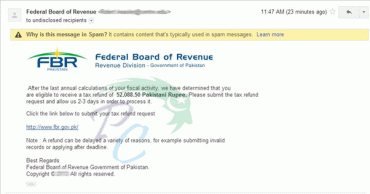The Federal Bureau of Revenue (FBR) is alerting regarding a consistent scam that is compelling people to reveal their sensitive information through the mention of tax refund.
[adinserter block =”3″]
How The Scam Works:
Basically, the emails look as if they are sent by the actual organization. The text within the email addresses that the person can claim their tax refund by clicking onto the link that is provided. However, it is a scam to lure out personal data like banking information out of the original person the email is sent to. People that have not been careful enough got robbed of their possessions. The incident peaked to the point that even the FBR had to come forward to inform that if one receives an email regarding a tax refund, it should not be clicked.
The subject of the email tends to be “FBR: Your 2019 Tax Refund Notice” and the body of the email sometimes has the amount of the tax refund mentioned. The “Click the link” option is always available as well. It is easy to trick people into thinking its real because clicking the link takes a couple of seconds. Not to mention, the decent amount of money also intrigues people into checking the link out.

Source: pakistancustoms
This sort of scam is the same as a phishing attack. It uses emails as a platform to pose as actual websites and dig out information from people. The link within those FBR emails has a slightly different URL than the normal. This is because these hackers aren’t able to manipulate the link to seem exactly like the real. Hence, anyone with a bit of expert in this area would be able to notice the difference from the get-go. Even the design and logos appear to match the actual versions of the FBR website.
Avoiding Such Emails:
[adinserter block =”10″]
The concept of phishing attacks easily lures people in and has a better success rate. The reason is that a good portion of the people the email is directed to, barely get to notice the little difference in the URL. And these emails tend to incite urgency by either asking for a password change because of expiration or this type of scenario. Hence, to avoid it firstly, check or click such links through another email. Try to search up on the internet on whether there is a particular scam going on over tax refunds. If there are previous experiences of people who went through the scam then it becomes easy to not fall for the same trick.
Regardless, one only needs to conduct each step with caution. The questionnaire within the link actually asks for detailed information about your bank information. Therefore, it is always better to take a few minutes out of your time to confirm whether the email is legit or a scam.
[adinserter block =”4″]
What do you think of the situation? Do you believe that these scams are getting out of hand? Should these hackers be arrested? Should the Federal Bureau of Revenue (FBR) take serious action against such people? Share your thoughts through the links below.







